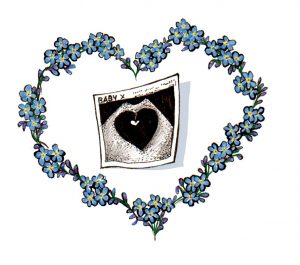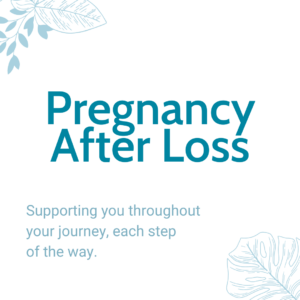Pregnancy after miscarriage
Pregnancy after a previous miscarriage, ectopic or molar pregnancy* can be really tough. Many people experience challenging mixed emotions including guilt, fear, anxiety, worry, hope and relief.
* Please note that we often use the term ‘pregnancy loss’ to include miscarriage, ectopic and molar pregnancy. But sometimes, using the word ‘miscarriage’ for all three makes it easier for people to find the information they’re looking for when using a search engine.
Living with uncertainty takes strength and courage, especially when things have gone wrong in the past.
No statistics, information or scans can remove the uncertainty and anxiety completely. But there are things you can do to increase your strength and ability to cope. We hope this information and support will help you make your own plan to get through the weeks and months ahead.
In these pages you can find general infomation that may be useful at any time in your pregnancy, as well as support for different stages of pregnancy.
General information:
- Finding ongoing support
- Finding a community
- Looking after yourself
- Remembering the baby or babies you lost
- Supporting someone who is pregnant after a miscarriage
Support for different stages:
We saw the two lines… then almost immediately the anxiety crept in. Anxiety like I had never known before. It was then I realised that anyone affected by miscarriage has the rosy view of pregnancy stolen forever. Gone is that innocent belief that two lines equals a baby.
We have written these pages with the person who is pregnant in mind but we know that partners (if you have one) may also struggle and most of this information is relevant to them too.
If you are using a surrogate for your pregnancy you may find yourself feeling even less in control of the outcome. If you are pregnant for someone who has experienced a previous loss or you have experienced a loss yourself, you may feel the same kind of anxieties. We hope you can find information and support that will help you here. You may also find it helpful to chat to people who understand more about your situation. Cots Surrogacy UK has an online Facebook group where you can talk to others. You may also find it helpful to search our Pregnancy After Loss Facebook groups and forums.
Finding ongoing support
You may have attended your booking-in appointment already and have the number of your midwife. If not, you could ask your practice nurse or GP what help they can offer. You might want to ask to be referred to counselling if possible.
Counselling can help give you the tools and techniques to manage ongoing uncertainty and cope with your feelings about your previous loss or losses and your current pregnancy. Have a look at our page on counselling after pregnancy loss for more information.
After the second one, I thought, ‘I’m not coping very well, I’m going to have to get some help with this’. So I went to counselling, which I continued through the first trimester of my third pregnancy.
If you are not happy with the care you are given, it is usually ok to request a different doctor or a second opinion. This isn’t always an easy process, especially if you are feeling vulnerable. Friends or family may be able to advocate for you and support you during this time.
Finding a community
Pregnancy after loss can be a very different experience of pregnancy. This can be isolating. Talking to others, or listening to them and their stories can help you feel part of a wider community going through something similar. You might also find that some of the things they found helpful are useful for you too. Here are some ideas to help you connect with others.
- Listen to others – there are a number of podcasts that explore pregnancy after loss. We have also shared a number of recorded audio conversations with women who have been there – click here and then select the audio tab.
- Connect online – Many people find online support on our Facebook groups or forum helpful. You can search posts to find women who are at a similar stage of pregnancy to you
- Connect in an app –some pregnancy apps recognise the experience of those who are pregnant after loss. They may have communities of users who you can talk to.
- Talk to us over the phone or through live chat. We have a Zoom support group for people who are pregnant after loss.
- Read other people’s stories – sometimes just reading about others’ experiences can help you feel less alone. Find stories about pregnancy after loss on our website or in our forum.
- Find helpful books – some self help and support books for pregnancy after loss can help you feel less alone.
- Create your own small community – Make a small messaging group of people who you trust to support you. These may be friends or people you meet online who understand how you feel.
I had a few people that I could talk to every day. And even if they hadn’t experienced it, there was no judgement on [my saying] ‘I’ve just taken my fifth pregnancy test of the day and its only 10am.’ That was absolutely fine. And that really helped.
Looking after yourself
Even starting along the path of pregnancy after a loss or losses takes courage and strength. This is a physically and emotionally demanding time for you. You are doing an incredibly difficult thing. It is not selfish to take time for yourself. Your body and mind deserve care.
Different things work for different people so you might need to try a few things out.
- Some women find that journalling and writing and reading positive coping statements help them manage uncertainty and anxiety in early pregnancy.
- Many women find pregnancy yoga helpful. Other relaxation techniques like hypnotherapy and meditation can also help you feel calmer.
- Breathing techniques can help you to take the edge of anxiety and panic by stimulating the release of calming hormones. Read more on our page about coping with scans.
- Some people find practicing mindfulness a helpful way to deal with anxiety and other difficult emotions. Some places offer specific pregnancy mindfulness.
- Take time to do things you enjoy, whether that is walks or other gentle exercise, gardening, cooking or just downtime with a film.
- Our information on looking after your mental health has some suggestions to help you improve your wellbeing.
- It is not selfish to take time for yourself. Try not to put pressure on yourself to cope with everything else while going through a pregnancy that may be emotionally and physically demanding. Perhaps ask your partner or family for more help with housework and childcare (if you have a living child already). Talk to your manager about reducing your hours or workload if you feel you need to.
If you are finding it hard to manage on your own, struggling to manage everyday tasks and feeling hopeless you may need additional support. Have a look at our information on pregnancy loss and mental health problems and talk to your doctor or midwife.
Whenever I started to think irrationally or feel panicked, I would listen to a hypnotherapy CD. Imagining I was somewhere safe and focusing on my breathing would slow down my heart rate and make me feel calmer.
Remembering the baby or babies you lost
 You may be mourning the baby or babies you lost while hoping for the baby you are pregnant with now. Some people find it helpful to make sense of these complex emotions by finding a way to stay connected to the baby or babies they have lost – perhaps by writing to them or talking to them or going to somewhere where you like to remember them.
You may be mourning the baby or babies you lost while hoping for the baby you are pregnant with now. Some people find it helpful to make sense of these complex emotions by finding a way to stay connected to the baby or babies they have lost – perhaps by writing to them or talking to them or going to somewhere where you like to remember them.
I felt guilty, as if by wanting and loving this baby, I was ‘moving on’ from the one who came before.
The Miscarriage Association has lots of ways to help you remember your baby or babies and mark the loss of their brief life.
We know not everyone will feel this way or want to mark their loss. There is no right way to deal with loss and it is important you do what is right for you.
Supporting someone who is pregnant after a miscarriage
It might be helpful to share some of these sections or stories with friends and family to help them understand how you are feeling and why things are difficult.
We have more specific info for friends and family on our page on supporting someone who is pregnant after a miscarriage.
One step at a time – support for different stages of pregnancy after miscarriage
 People we spoke to said that they usually found it easier to focus on the day or week of pregnancy they were at right now. Looking too far ahead felt impossible and engaging with others at different stages sometimes just added to their worries.
People we spoke to said that they usually found it easier to focus on the day or week of pregnancy they were at right now. Looking too far ahead felt impossible and engaging with others at different stages sometimes just added to their worries.
We have pulled together suggestions and ideas that may help at different stages of pregnancy. You may want to read them all at once or drop in and out depending on what you need right now.
- Finding out and early pregnancy after miscarriage
- Coping with scans when pregnant after miscarriage
- Coping during the second trimester of pregnancy after miscarriage
- Coping during the third trimester of pregnancy after miscarriage and after the birth
- Journalling and positive affirmations in pregnancy after miscarriage
- Using the internet and finding online support when pregnant after miscarriage
- Useful resources and extra support for pregnancy after miscarriage
On each page we have explored some of the things that people have told us they find difficult. We know not everyone will experience everything. If we’ve missed anything important, please do let us know.
We make suggestions for support to help you think about what might be useful for you and include some links to other resources too.

